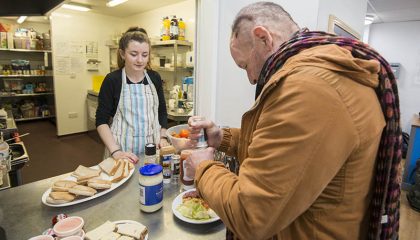About this statement
The statement applies to how Julian House, and its subsidiary, collects and uses data, how we protect the data, your rights and how you can exercise those rights. The terms of this statement are regularly updated so please check it from time to time. This statement was last updated in July 2024. We have tried to make this statement comprehensive, but it is not an exhaustive list of how we use data. If you have any queries about this privacy statement, please contact us using the details in the Contact us section below.
Who we are
Julian House is a group made up of two organisations:
- Julian House: A registered charity in England and Wales (no. 1183751) and a company limited by guarantee (no. 11791952).
- Julian House Trading Limited: A wholly owned trading subsidiary of Julian House, which is a registered company (no. 03450273).
Julian House is registered with the Information Commissioner’s Office (ICO).
Our commitment to your data
All personal data is collected and processed in accordance with UK legislation, including the Data Protection Act 2018, the UK General Data Protection Regulation (UK GDPR) and the Privacy and Electronic Communication Regulations (2003). To help you understand how this legislation protects you, information and advice is available on the Information Commissioner’s Office website.
We want every interaction people have with Julian House to be positive. In all areas of our work, we are committed to protecting your data, being open about what information we hold, ensuring that we only gather information as necessary and retaining it only for as long as we need to.
Whose data do we hold?
As part of our work, we collect and process personal data about the people who interact with us, for example our clients, donors, staff, volunteers, customers, funders, and contractors.
The information we hold about you will depend on your relationship with us. This Privacy Statement covers the main aspects of how we use personal data. Please use the links below to access further privacy information for specific groups of individuals:
- Basic personal information: full name, date of birth
- Contact details: postal address, email address, telephone number
- Reference numbers: National Insurance number, Housing Benefit and Universal credit
- Diversity information: ethnicity, gender, religion, disability, and sexual orientation
- Physical and mental health & medical information
- Substance misuse history
- Support needs & history of external agencies who are or have been supporting you
- Next of kin/emergency contact details
- History of criminal convictions and offences
- CCTV images (from our accommodation and offices)
- Photographs, videos and audio recordings (only with your consent)
- Your support plan which we will discuss and agree with you.
- Notes of the actions we have taken to provide you with support.
- Your risk assessment about your situation.
- Letters of your entitlement to housing benefit.
- To provide our service to you including support, housing management and property maintenance (if applicable)
- For security purposes to keep you, our staff, and contractors safe
- To produce statistics to improve our services or if requested to do so by government agencies.
- Police, health, and emergency services
- Housing Benefit department
- Social services.
- Your full name
- Contact details: postal address, email address, telephone number
- Bank account details
- Relationships to other donors if known e.g. parent, child
- Current interests and activities relevant to Julian House’s work or our fundraising
- Gift Aid status
- Donation history
- Event registration and attendance
- Communication preferences
- Event photographs, videos, and audio recordings (only with your consent)
- Responses to surveys about our fundraising activities
- Emails sent between you and our Fundraising team
- To understand your needs and interests as a donor so that we can provide you with relevant and interesting marketing information, if you would like to hear from us.
- To generate future income by making appropriate requests from you
- To claim Gift Aid on your donation if applicable.
- Basic personal information: Full name, date of birth, nationality, National Insurance number, passport number, driving licence
- Contact details: postal address, email address, telephone number
- Bank account details
- Diversity information: Ethnicity, gender, religion, disability, and sexual orientation
- Physical and mental health & medical information
- Details of lived experience (if relevant)
- Next of kin/emergency contact details
- Details of your qualifications, skills, previous employment history and employer references
- The results of DBS checks and documentation for DBS check e.g. bank statements, HMRC documents
- CCTV images (from our accommodation and offices)
- Photographs, videos and audio recordings (only with your consent)
- Supervision notes
- Applications and interview notes for other roles
- Sickness history
- Disciplinary or investigation notes.
- Salary information
- Equalities characteristics
- To help you to be your best for both you and Julian House by providing support if you need it and reviewing your performance
- To pay your salary
- To investigate issues that may arise during your employment
- To help manage sickness levels
- To meet our legal obligations for example to ensure that you are entitled to work in the UK
- To assess your suitability for the role
- To defend Julian House against legal claims
- For equal opportunities monitoring.
- To complete employment checks via references and DBS checks
- Basic personal information: full name, date of birth, nationality
- Contact details: postal address, email address, telephone number
- Next of kin/emergency contact details
- Details of your qualifications, skills, references
- The results of a DBS check and documentation for DBS check e.g. bank statements, passport, HMRC documents etc
- CCTV images (from our accommodation and offices)
- Photographs, videos and audio recordings (only with your consent)
- Supervision notes
- To help you to be your best for both you and the Julian House by providing support if you need it
- To meet our legal obligations for example by performing DBS checks
- To assess your suitability for the volunteering role
- For equal opportunities monitoring.
View our client privacy statement
Further privacy information for clients of Julian House
To provide support services to you we will need to collect, share, and store personal information relating to you and your involvement with us.
What information do we hold about clients?
The information we hold about you will depend on the service you are receiving. The information held would normally include the following:
Where does the information about clients come from?
You may provide the information to us. We may also obtain details from other relevant organisations because of a referral to our service or because they continue to provide you with supervision, care, or support (e.g. social services).
What information do we record about our clients?
When you write or speak to staff you may give information to them to help us to provide you with the service, or to respond to a request you may have. We record these interactions on your file to help us deliver support to you. Examples of the records we hold are shown below:
Where do we store your information about clients?
We store your data electronically wherever possible on cloud-based servers, either in a client database system or in an electronic filing system. Any data obtained in paper format is scanned onto our electronic database and the paper copy is destroyed. If this is not possible the hard copy will be held securely.
How do we use your information about clients?
We use your data for the following purposes:
What lawful basis do we use to process client’s data?
In most cases, we use the legitimate basis of processing as we cannot provide the service to you without your data.
We may need to share your data with another organisation. In this case we will ask for your consent before doing so.
We may have a contract with you, for example if you have a licence agreement to stay in our accommodation. In this case we process your data to fulfil our contractual obligation with you.
There may be an instance when we process your data to protect your life or someone else’s. We will only use this basis of processing in an emergency.
Who can view client’s data?
Your information will be shared within the organisation with the fewest number of people as possible. This would normally include members of staff working in the service you are accessing, and certain members of the Health and Safety team and Finance team.
When do we disclose client information to a third party?
We may need to disclose your information to a third party if this is necessary to provide you with support, for example:
We will discuss this with you as we go along and will only act if you have given consent or if we are acting under another basis of processing.
We will share your information on a strictly “need to know” basis.
If we are using the basis of consent, your consent will be reviewed regularly. You have the right to withdraw your consent. If you wish to withdraw your consent, please contact your support worker.
View our donors privacy statement (including fundraising event participants)
Further privacy information for donors to Julian House
When you donate to Julian House, unless it is anonymous, we will collect, share, and store personal information relating to you.
What information do we hold about donors?
The information we hold about you would normally include the following:
Where does the information about donors come from?
You may provide the information to us. We may also receive information when you donate using our website and third-party donation platforms such as Just Giving.
What information do we record about donors?
As a donor we will record information relevant to our fundraising activities. Examples of the records we hold are shown below:
Where do we store donor’s information?
We store your data electronically wherever possible on cloud-based servers, either in a donor database system, or in an electronic filing system. Any data obtained in paper format is scanned onto our electronic database and the paper copy is destroyed.
How do we use donor’s information?
We use your data for several purposes, mainly:
Do we use data profiling?
Yes, we may use profiling and database segmentation techniques to analyse your personal information, and create a profile of your interests, and preferences. A targeted approach allows us to ensure communications are relevant and timely, to provide an improved experience for our supporters. It also helps us understand the background of our supporters so that we can make appropriate requests to those who may be willing and able to donate more than they already do or leave a gift in their will. This enables us to raise funds quicker and in the most cost-effective way.
We use information that is already in the public domain (information that has been published in print or online), such as Companies House, to identify individuals who may be interested in supporting our work. We also carry out research to identify existing supporters who may be able to join our major donor programme. This is based both on publicly available information and information our supporters have given us voluntarily e.g. where a person lives.
What lawful basis do we use to process donor’s data?
We hold basic details of your donation and Gift Aid status so that we can comply with our legal obligations to keep financial records and claim gift aid.
We may approach you for fundraising purposes or marketing purposes if you have given your consent for us to do so.
Who can view donor’s data?
Your information will be shared within the organisation with the fewest number of people as possible. This would normally include members of the Fundraising team.
When do we disclose donor’s information to a third party?
In order to claim Gift Aid, we will need to disclose some of your information as required by HMRC.
We will not disclose any other information without your consent.
Money laundering
In order to comply with money laundering regulations, we are legally required to perform certain checks on large donations.
View our staff privacy statement
Further privacy information for Julian House staff
To work as a member of staff at Julian House we will need to collect, share, and store personal information relating to you.
What information do we hold about staff?
The information we hold about you would normally include the following:
Where does the information about staff come from?
You may provide the information to us. We may also obtain details from other relevant organisations such as references from former employers or DBS checks.
What information do we record about staff?
Throughout your employment with us we will record information relevant to your role and your performance. Examples of the records we hold are shown below:
Where do we store staff information?
We store your data electronically wherever possible on cloud-based servers, either in a staff database system or in SharePoint. Any data obtained in paper format is scanned onto our electronic database and the paper copy is destroyed.
How do we use staff information?
We use your data for several purposes, mainly:
What lawful basis do we use to process staff data?
We have a contract of employment with you and so we process your data to fulfil our contractual obligation with you.
There may be an instance when we process your data to protect your life or someone else’s. We will only use this basis of processing in an emergency.
Who can view staff data?
Your information will be shared within the organisation with the fewest number of people as possible. This would normally include members of the HR team and the Senior managers in your team.
When do we disclose staff information to a third party?
We may need to disclose your information to a third party if this is necessary to provide you with support, for example to the Police, health, and emergency services.
We will discuss this with you as we go along and will only act if you have given consent or if we are acting under another basis of processing. If we are using consent, we will review this regularly. You have the right to withdraw your consent. If you wish to withdraw your consent, please contact us.
We will only share your information on a strictly “need to know” basis.
View our volunteer privacy statement (including Trustees/Directors)
Further privacy information for Julian House volunteers (including Trustees/Directors)
To act as a volunteer at Julian House we will need to collect, share, and store personal information relating to you.
What information do we hold about volunteers?
The information we hold about you would normally include the following:
Where does the information about volunteers come from?
You may provide the information to us. We may also obtain details from other relevant organisations such as employer references or DBS checks.
What information do we record about volunteers?
Whilst you are a volunteer at Julian House we will record information relevant to your role. Examples of the records we hold are shown below:
Where do we store volunteer information?
We store your data electronically wherever possible on cloud-based servers, either in a volunteer database system or in an electronic filing system. Any data obtained in paper format is scanned onto our electronic database and the paper copy is destroyed.
How do we use volunteer information?
We use your data for several purposes, mainly:
What lawful basis do we use to process volunteer data?
We may ask you to sign a volunteer agreement with us. If so, we will process your data to fulfil our contractual obligation with you.
We have a legitimate interest to use your data to enable you to work as a volunteer for us.
There may be an instance when we process your data to protect your life or someone else’s. We will only use this basis of processing in an emergency.
Who can view volunteer data?
Your information will be shared within the organisation with the fewest number of people as possible. This would normally include members of the HR team and your Volunteer Manager.
When do we disclose volunteer information to a third party?
We may need to disclose your information to a third party if this is necessary to provide you with support, for example to the Police, health, and emergency services.
We will discuss this with you as we go along and will only act if you have given consent or if we are acting under another basis of processing. If we are using consent, we will review this regularly. You have the right to withdraw your consent. If you wish to withdraw your consent, please contact us.
We will only share your information on a strictly “need to know” basis.
As a trustee or director of Julian House you have responsibilities for the organisation. As such your information will need to be shared with a number of parties including Companies House, the Charity Commission, Homes England, our auditors, our bankers and our investment managers.
Why do we collect your data?
We primarily collect data in relation to the contract or relationship we have with individual clients, particularly when it’s necessary to support their journey through our services. Some of the other reasons we might collect your data include:
- To enhance our service quality
- To tailor our services for training and resource allocation
- To understand our supporters better and help us to fundraise more effectively
- To process donations and administer Gift Aid
- To process a purchase made in one of our shops
- To consider your job or volunteer application
- To keep people safe, whether they are visitors to our shops, staff, or participants in events.
What information do we collect?
The kind of data we collect depends on how you interact with us. The type of data we collect from you might include:
- Your full name and date of birth
- Contact details – including postal address, telephone and email address
- Employment history
- Records of your engagement with us
- Photographs, videos or audio recordings if you participate in an event
- CCTV footage when you visit one of our sites
- Bank/credit/debit card details
- Gift aid details
Special category data
The law recognises that certain categories of personal information are more sensitive. This is known as special category data and covers health information, race, religious beliefs, and political opinions.
Our main use for special category personal data will be to provide the services that we are commissioned to deliver, and we will always make it clear to our clients what data we are collecting, why we are collecting this data and what purposes we may use it for.
We will not collect special category data about non-clients unless there is a clear reason for doing so. For example, to enable everyone to participate in a fundraising event or initiative, we may need this information to ensure that we provide appropriate facilities or support to enable your participation.
How do we collect information?
Julian House collects information in the following ways:
Information from third parties:
We may receive information about you from third parties and from the public domain. We, like all charities and companies, can confirm what browser you are using, the IP address and computer operating systems that are being used and this information may be used to improve the services we offer.
Information you give us:
When you become a client or an employee, engage with our social media, make a donation to us, register for an event or otherwise provide us with personal information.
Information we get from your use of our website and digital services:
We collect information about the services you use and how you use them, like when you watch a video on YouTube, visit our websites or view and interact with our ads and content. This helps us to understand your interests in our cause and information and to tailor our resources to be more focused on what supporters or clients need.
Publicly available information:
We may use publicly available information to research who might be willing to donate to us. Information may include newspapers and Companies House.
What is our lawful basis for processing data?
We need a lawful basis to collect and use your personal data under data protection law. There are six lawful bases for processing personal data (with enhanced conditions for sensitive personal data) as follows:
- Processing is necessary for compliance with a legal obligation (for example to process a Gift Aid declaration, or to process salary payments)
- In our legitimate interests (for example so that we can provide services to our clients)
- When we use this basis, we will always consider if it is fair and balanced to use your data in this way and if it is within your reasonable expectations.
- We hold consent (for example, to send you marketing emails)
- To fulfill a contractual relationship (for example, to provide you with goods purchased from our shops)
- To protect a person’s life (for example if someone is unconscious)
- To perform a public task (for example to answer a data request made by the police).
What are your rights?
You have rights under data protection legislation. If you would like to use your rights, please contact us using the details in the Contact us section below. Your rights include:
Right to be informed
You have the right to be informed about how your personal data will be used. This Privacy Statement, as well as any additional information or notice that is provided to you is intended to provide you with this information.
Right of access (Subject Access Request)
You have the right to know what information we hold about you and to ask to see your records. We will always confirm your identity before we proceed with your request.
Right to rectification
You have the right to ask us to update our records if you believe that any data we hold is inaccurate or incomplete.
Right to erasure
You have the right to ask us to erase your personal data in certain circumstances. For example, if the information is no longer necessary for the purpose for which it was collected, or if you withdraw your consent (if we are relying on consent as a basis for processing).
Right to restrict processing
You have the right to ask us to restrict the processing of your data. This means that we can store your data but not use it.
Right to data portability
You have the right to request that we transfer some of your data to another service provider. This right only applies to data that is processed by automated means and is based on your consent or a contractual obligation.
Right to object
You have the right to object to the processing of your data. We will consider your request and respond with our decision.
Rights related to automated decision-making
You have the right to object to decisions made about you by automated means. We do not use automated decision-making in our processes.
Do we use any data processors?
In some cases, we may use external suppliers to process personal data on our behalf. For example, we may use a third-party company to process payments for donations. When we do so, we have contracts in place to ensure that your data is processed securely and in accordance with data protection legislation.
How do we keep your data safe?
We take the security of your data very seriously. We have implemented appropriate technical and organizational measures to protect your data from unauthorized access, use, or disclosure. These measures include:
- Encryption of data
- Access controls and authentication processes
- Regular security assessments and audits
- Training for staff on data protection and security
How long do we keep your data?
We will only retain your personal data for as long as it is necessary to fulfill the purposes for which it was collected, including for the purposes of satisfying any legal, accounting, or reporting requirements. Our retention periods vary depending on the type of data and the purpose for which we hold it. If you would like more information about our retention periods, please contact us.
Contact us
If you have any questions about this Privacy Statement or how we handle your personal data, please contact us at:
Email: info@julianhouse.org.uk
Phone: 01225 354650
Address: Julian House, 1 Kelso Place, Upper Bristol Road, BATH, BA1 3AU.






